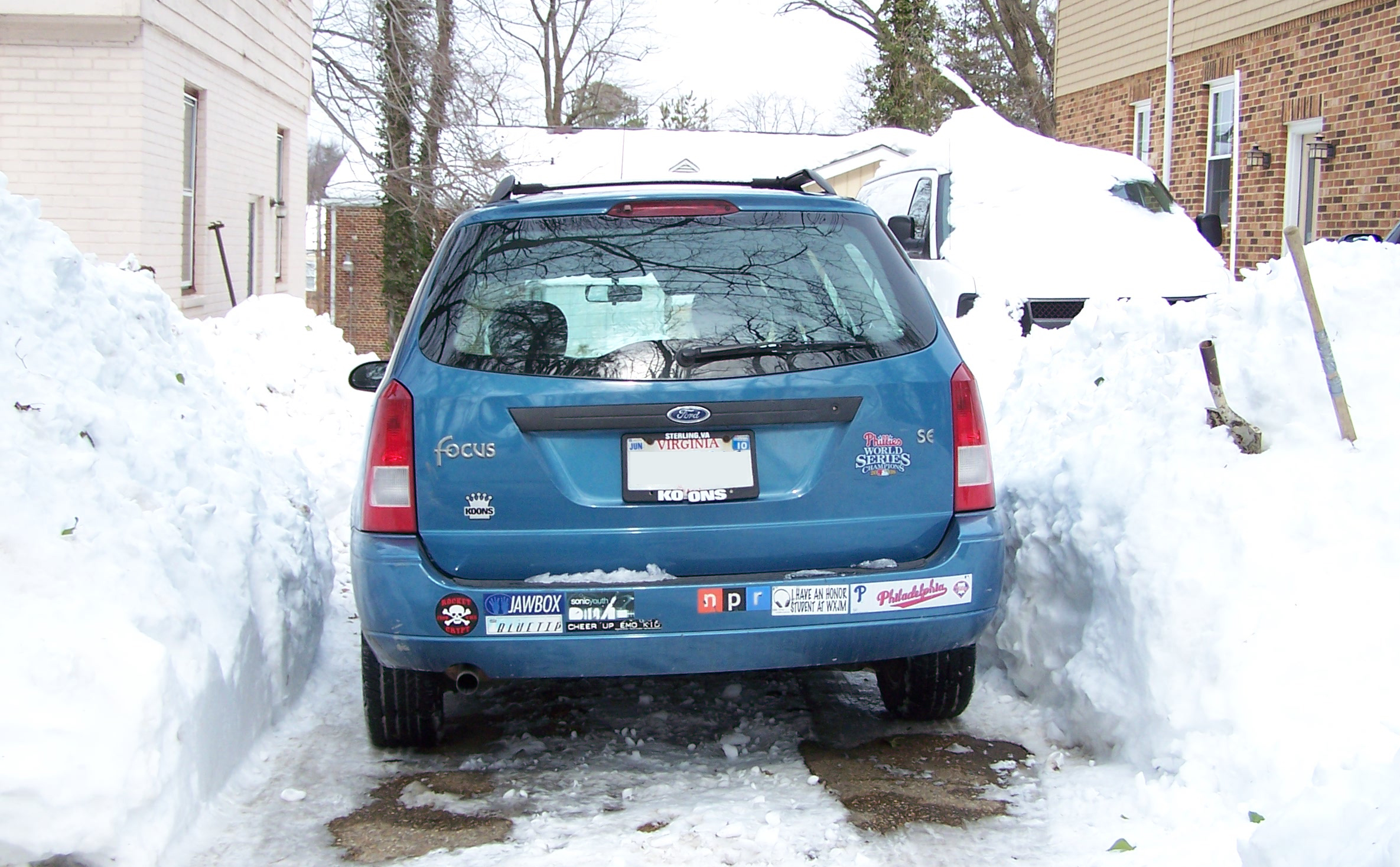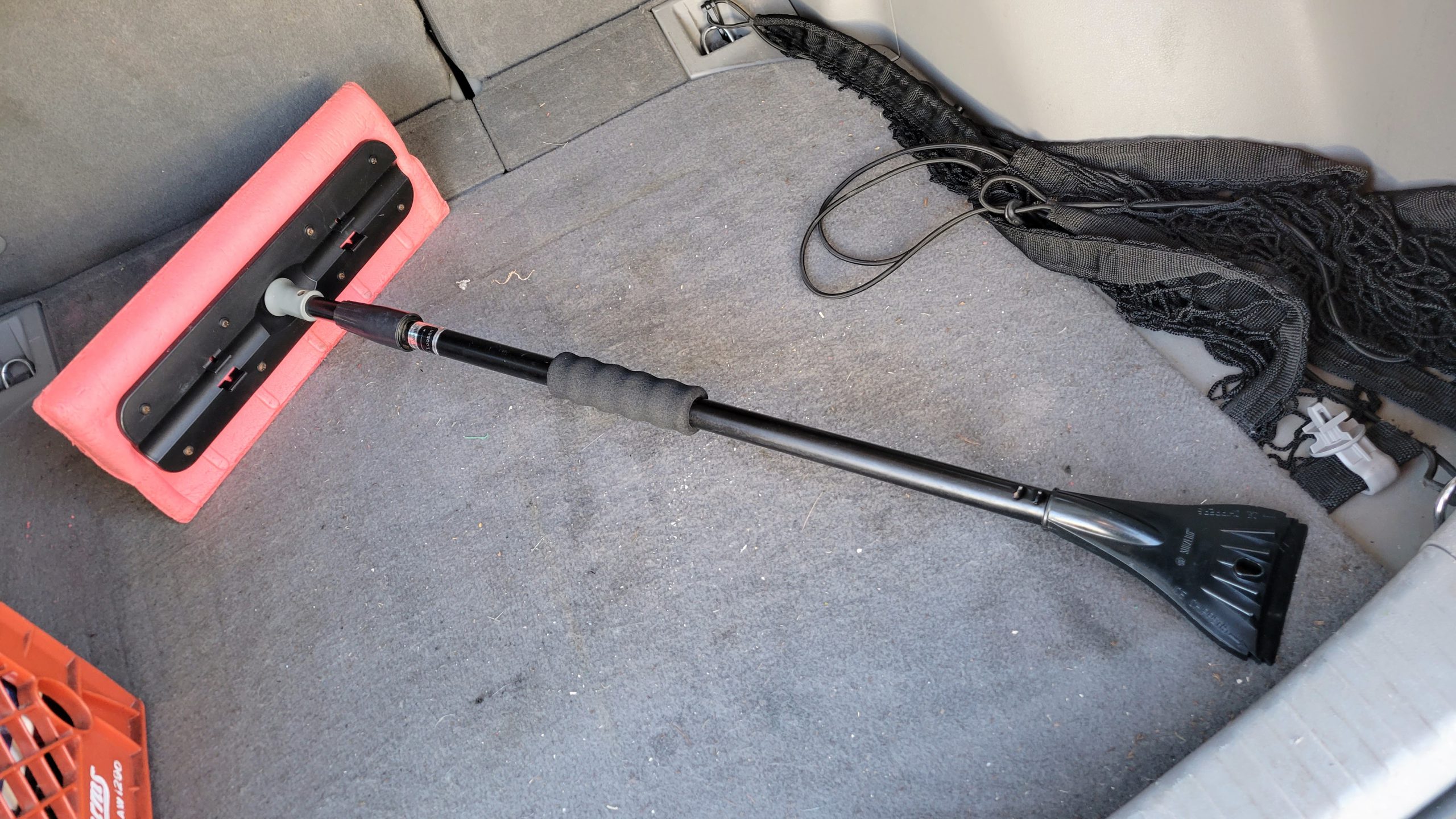“Drive it ‘til the wheels fall off” isn’t the safest decision. So when does it end?

As we are deep into winter here in the northern hemisphere, I believe it’s time for this seasonally appropriate rant: clean the #&@$ing snow off the roof of your car or truck.

Now this is a well-cleaned car ready to hit the road! Photo by Jonathan Roth.
Look, I’ve been there. You’re running late for work after a big storm the night before, and you just want to do the bare minimum to get your car on the road and get to work. Well, don’t. According to research by the AAA Foundation for Traffic Safety, about 46 percent of crashes involving bad weather take place in the winter, and nearly every one of them is due to someone not spending time to actually prepare his or her motor vehicle for driving. Or at least that’s how I choose to interpret it. If it’s light and fluffy snow, it’ll blow off as you’re driving and obscure the visibility of other drivers. I’ve already driven behind people with so much flaky snow blowing off their car that I might as well have been in a thick fog. And if it’s in a truck bed? Powdery snow in a truck bed can blow for a damn hour, it seems like. If it’s hard-packed snow, that’s even worse. It’ll fly off the vehicle in sheets (also known as “ice missiles”), potentially smashing into someone’s windshield and possibly killing them.
Back in February 2019, a six-year-old girl was injured in Andover, Massachusetts when a large piece of ice flew off a tractor-trailer and hit the windshield of the vehicle she was in, narrowly missing her eye. And that was after a similar incident happened the very same day in New Hampshire. In December 2020, ice flew off the roof of a truck in Londonderry, New Hampshire, smashing the window of a following car and seriously injuring the driver. The driver of the truck was charged with vehicular assault, reckless conduct, and negligent driving. In February 2021, a large chunk of ice flew off the top of a box truck in New Haven, Connecticut and smashed through a car windshield, injuring the driver. I seriously could go on and on with examples like this.
You see this kind of behavior all the time. The Buffalo Bills were playing an away game this past Christmas Eve, while Buffalo was getting buried in four feet of snow. Video of the players coming back to their cars buried in snow went viral, but I chose to focus on the white SUV that barely had any snow cleared off the back.
After Buffalo #Bills played on Saturday Christmas Eve, they had to wait till Sunday and then had to fly to Rochester NY w Buffalo airport closed. Bused to their cars and they were buried in snow. Amazing. pic.twitter.com/zfmD0157Aw
— Howard Eskin (@howardeskin) December 26, 2022
In fact, in six states (New Hampshire, Connecticut, Michigan, New Jersey, Pennsylvania, and Rhode Island), the law explicitly says that snow and ice need to be cleared off your entire vehicle. In two of those states, the laws are actually named for drivers who were killed by ice falling from vehicles: Jessica’s Law in New Hampshire and Christine’s Law in Pennsylvania. Even in states that don’t have a specific law, police can and will cite motorists with driving with an unsecured load if they don’t clear the snow or ice off, or can hold the driver liable if that snow or ice causes an accident. This past December, a Washington state patrol trooper stopped a driver whose vehicle was completely covered in snow. The driver received a $553 ticket for negligent driving in the second degree. In fact, if you do just a quick Google search about accidents caused by snow not cleared from the roof of a vehicle, you’re likely going to get links to a bunch of accident lawyer websites with information on this very topic. Do you really want to be on the receiving end of a lawsuit from one of these places?
The solution is really very simple. Buy a snow broom for your vehicle, keep it in your vehicle (maybe as part of your “car crate”), and use it. You can find them for as low as $12. I have one in my car. It’s a cheap one, but it does the job of pushing the snow off the roof. Just from my observations, though, there are too few damn people who have or use them. I also recommend reading this piece from the New York Time’s Wirecutter about best practices, steps, and tools for completely clearing the snow from your car.

It ain’t much, but it gets the job done. Photo by Jonathan Roth.
Possibly the biggest and most dangerous offenders of not clearing snow are tractor trailer drivers. I’ve already been on the highway behind a tractor trailer that had ice missiles flying off its roof, and boy, that was one of my scarier experiences while driving. I get that clearing snow and ice from the tops of trailers can be very difficult and often unsafe, but it is way more unsafe to have ice missiles flying off a trailer. However, I get that we don’t have a great solution for this yet. Fleets need to have some means of easily clearing the snow off the roofs of trailers, and there should also be something to remove snow from trailers at truck stops and weigh stations. We need ideas, pressure on fleets, and legislation to solve it. Some ideas have been thrown out like having defrosters on the roofs of trailers or making them curved or sloped in some way. Something similar to the FleetPlow shown in the video below would be great.
Whether or not we stop salting the roads, as my colleague Lemmy has proposed, it’s incumbent on all drivers to use freaking common sense when snow and ice storms hit. This must include all of us doing a better job of cleaning the snow and ice off our cars.
The articles and other content contained on this site may contain links to third party websites. By clicking them, you consent to Dorman’s Website Use Agreement.
Participation in this forum is subject to Dorman’s Website Terms & Conditions. Please read our Comment Policy before commenting.